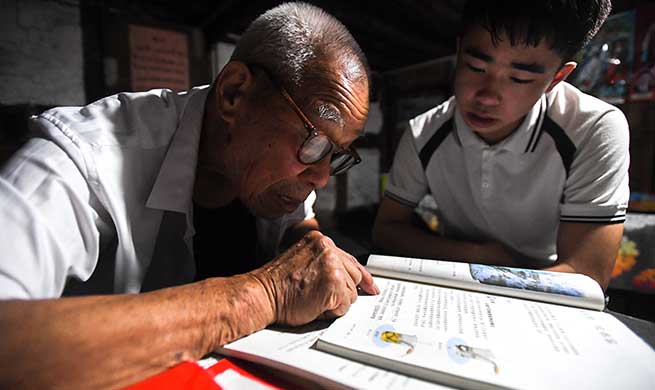ADDIS ABABA, Sept. 10 (Xinhua) -- The Ethiopian government has unveiled a new economic reform blueprint, dubbed Homegrown Economic Reform, with a major aspiration to unlock the country's development potentials.
"Several months in the making and spearheaded by some of Ethiopia's finest minds, our initiative aims to propel Ethiopia into becoming the African icon of prosperity by 2030," said Ethiopia's Prime Minister Abiy Ahmed, while unveiling the new economic reform agenda on late Monday at the UN Conference Centre in the Ethiopian capital, Addis Ababa.
The newly introduced initiative, among other things, outlined macroeconomic, structural and sectoral reforms that are said to pave the way for job creation, poverty reduction, and inclusive growth.
The Ethiopian premier said that his government has taken a series of measures to shift the economic landscape of Ethiopia, which include reforms in investment laws and business climate, eventually contributing to remove regulatory obstacles that hamper investment in the East African country.
Ahmed, who noted that the private sector was crucial for the next chapter of Ethiopia's growth and development, further stressed that the Ethiopian government has "opened up key economic activities to private investments."
Ahmed, who also on Monday briefed development partners and members of the diplomatic community that are based in Addis Ababa on the major aspirations and targets of Ethiopia's homegrown economic reforms, stressed that the series of measures will "surely be reflected in Ethiopia's ease of doing business ranking."
"We are tightening our fiscal belts, strengthening our public sector finances, shedding our debts, and increasing domestic resource mobilization," said Ahmed, adding that the move is vital in ensuring the success of the new economic development agenda.
The initiative gives special emphasis to sectors such as agriculture, manufacturing, mining, tourism, and information, communication and technology, it was noted.
Ahmed also urged Ethiopia's development partners attending the economic reform-themed meeting, which mainly brought together representatives from the World Bank, International Monetary Fund (IMF), various UN agencies and other development partners, to "support us in crafting Ethiopia's economic miracle."
"We realize that our interdependence solidifies Ethiopia's geopolitical importance in becoming Africa's gateway to the global market," he added.
Executive Secretary of the United Nations Economic Commission for Africa (ECA), Vera Songwe, who noted the East African country's aspiration to expand its GDP per capita from 865 to 2219 as "very ambitious," also stressed that the target is "doable."
The ECA chief also underscored the success stories of China, Laos and Vietnam in realizing similar ambitious economic developments over the past decades, which Ethiopia could also replicate as part of its new economic reform blueprint.
Songwe, however, cautioned that Ethiopia currently has a 10 billion U.S. dollars gap - amounting 6 billion U.S. dollars in new investment and 4 billion U.S. dollars of debt reduction per year - that "must be bridged" in order to achieve its reform aspirations.
"If you continue to accumulate debt the way you're doing now, you will likely fall into debt distress in the next two years and a lot of the structural reforms you have put in place will not bring in the private sector because you will not be a credit-worthy country," Songwe stressed.
As Ethiopia's new economic reform mainly envisaged to boost the private sector's contribution in its overall economy, Songwe emphasized that "credibility is what the private sector will be looking for in the reform package."
She further recommended paving the way for Independent Power Producers in the East African country's reformed energy sector as a quick-win that can demonstrate the country's credibility.













